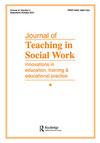Endorsement of Critical Social Justice and Privilege: Heterosexual and Cisgender Privilege Awareness Among Social Work Students in the US
IF 0.9
Q3 EDUCATION & EDUCATIONAL RESEARCH
引用次数: 0
Abstract
Despite its central role in social work practice and education, little is known about how social justice is operationalized within the discipline. One aspect that may shed light on how the field engages the construct of social justice is through understanding more about recognition of privilege. This study examines how demographic differences, psychosocial predictors, and social work program variables may be related to increased levels of heterosexual and cisgender privilege awareness among social work students. In the heterosexual privilege model (N = 585), increased privilege awareness was associated with identifying as a cisgender woman, a more liberal political orientation, completing a course on power, privilege, and oppression, a critical endorsement of social justice, and being a 2-year MSW or doctoral student. In the cisgender privilege model (N = 758), predictors of increased privilege awareness included identifying as a cisgender woman, identifying as gay, a more liberal political orientation, completing a course on power, privilege, and oppression, a critical endorsement of social justice, and being a 2-year MSW or doctoral student. The findings demonstrate the importance of understanding social justice from a critical perspective and for educators to effectively communicate the connections between social justice and social work practice. Effective strategies to do this are discussed.批判社会正义与特权的认可:美国社会工作专业学生的异性恋与顺性特权意识
尽管社会正义在社会工作实践和教育中发挥着核心作用,但人们对社会正义如何在这一学科中运作知之甚少。一个可能阐明该领域如何参与社会正义构建的方面是通过更多地理解对特权的承认。本研究探讨了社会工作学生中人口统计学差异、社会心理预测因素和社会工作项目变量如何与异性恋和顺性特权意识水平的提高相关。在异性恋特权模型(N = 585)中,特权意识的增强与认同为顺性女性、更自由的政治取向、完成关于权力、特权和压迫的课程、对社会正义的批判性认可以及成为2年的MSW或博士研究生有关。在顺性别特权模型(N = 758)中,特权意识增强的预测因子包括:确认自己是一名顺性别女性、确认自己是同性恋、更自由的政治取向、完成关于权力、特权和压迫的课程、对社会正义的批判性认可,以及做过2年的城市生活妇女或博士生。研究结果表明,从批判的角度理解社会正义,以及教育工作者有效沟通社会正义与社会工作实践之间联系的重要性。讨论了实现这一目标的有效策略。
本文章由计算机程序翻译,如有差异,请以英文原文为准。
求助全文
约1分钟内获得全文
求助全文
来源期刊

Journal of Teaching in Social Work
EDUCATION & EDUCATIONAL RESEARCH-
CiteScore
1.20
自引率
0.00%
发文量
36
期刊介绍:
The Journal of Teaching in Social Work fills a long-standing gap in the social work literature by providing opportunities for creative and able teachers—in schools, agency-based training programs, and direct practice—to share with their colleagues what experience and systematic study has taught them about successful teaching. Through articles focusing on the teacher, the teaching process, and new contexts of teaching, the journal is an essential forum for teaching and learning processes and the factors affecting their quality. The journal recognizes that all social work practitioners who wish to teach (whatever their specialty) should know the philosophies of teaching and learning as well as educational methods and techniques.
 求助内容:
求助内容: 应助结果提醒方式:
应助结果提醒方式:


